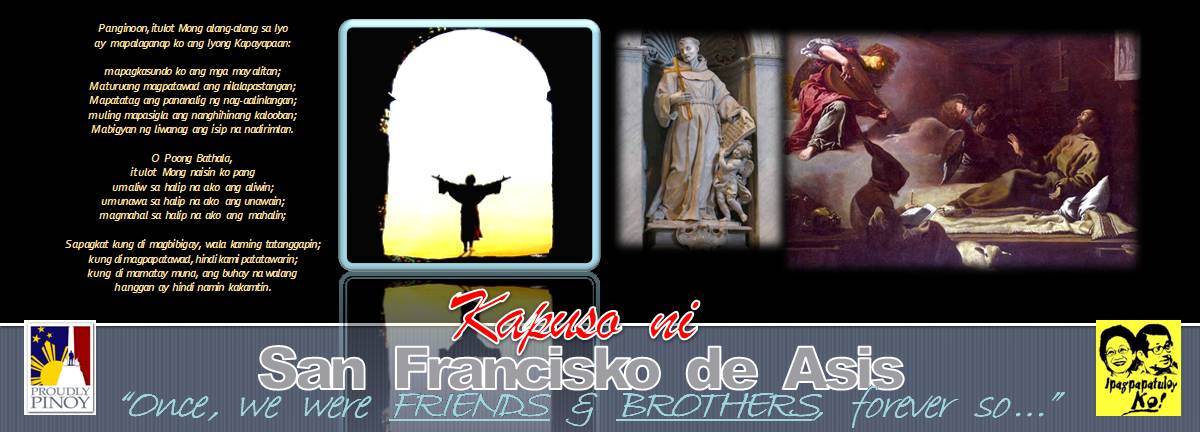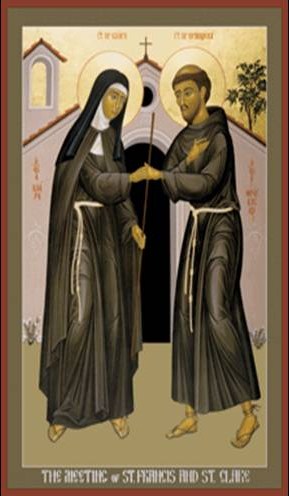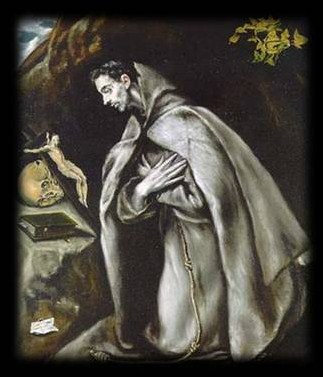
No less edifying and still more charming was the famous Brother Juniper, who entered the Order in 1210. He was present at the death of St. Clare in 1253, and died in Rome five years later. St. Clare, who loved and understood him, nicknamed him “GOD’s jongleur (troubadour)”. As for Francis, who did not require everyone to be like everybody else, he replied to those who considered Juniper’s whimsies out of place, “O brothers! I wish I had a whole forest of junipers like him!” Brother Juniper enjoyed such reputation for sanctity that we are told possessed persons would flee across fields to avoid meeting him. Francis himself, when he had to deal with some especially recalcitrant demon, had only to say to it, “I am going to call Juniper,” for the demoniac to be immediately delivered. They tell how, in order to observe the rule of “not resisting evil,” Juniper once let himself be taken for a spy at Viterbo and condemned to death without protest. Tied to a horse’s tail, they were already dragging him to the gallows, when at the last moment his guardian rushed up and managed to clear up the confusion and rescue the alleged traitor. It is also reported that in order to practice recollection, Juniper once went six months without saying a word. The first day he kept silent in honor of GOD the Father, the second day in honor of GOD the Son, the third in honor of the Holy Spirit, the fourth for the love of the Blessed Virgin, and so on. Everyday he kept silent in honor of some new saint. But juniper when he did speak, expressed himself with deep wisdom, if we are to judge by the two following examples: “Do you know any noblemen whose nobility would keep them from hauling dung, if that would enable him to win a houseful of gold? Then why should we be so hard to please, and why refuse little humiliations that can gain eternal happiness for us?” To his fellow friars who were discussing how to repel impure thoughts, he indicated his own method: “As for me, as soon as I sense the tempter’s approach, I shut myself up in my heart with holy thoughts. Then I shout to the devil who knocks at the door, ‘Begone!

The inn is full and we’re not opening up to anyone!’ And when the devil hear this, he at once goes away in defeat.”Juniper was not a man who wish for honors here below, content, like so many others, to give the glory to GOD. Some devout Romans learned this at their expense the day they set forth to meet him as he was approaching the Eternal City. Seeing some children playing seesaw, Brother Juniper made a show of entering into their game; and with great seriousness, as if he had nothing better to do that day, he began to seesaw until his disappointed admirers withdrew. The early Rule, following the Gospel, said “Let the Brethren give to all who ask; and if someone takes away their garment and tunic, let them be stripped without protest.” Such precepts made Brother Juniper commit not a few excesses. Like his blessed father, he could not stand seeing a poor man worse clad than he; and sometimes he would give the needy great pieces of cloth cut out of his habit, and sometimes his whole tunic. His guardian had just reprimanded him about this, when he met a beggar shivering in his rags. “You’ve come at a bad time,” said Juniper to him. “My superior has just forbidden me to give away my tunic. But if you want to take it away from me, I won’t stop you.” The beggar needed no second invitation; and lifting up the charitable friar’s habit, he pulled it off wrong side out, so that Juniper had to return home in his drawers. Since much fun was made of him on this occasion, he wanted to repeat the experience so as to acquire new merits.After another such “folly” in which he walked naked from Spoleto to Assisi, the exasperated guardian exclaimed: “O Brother Juniper! I really don’t know what penance to give you this time to such scandalous conduct!” “Father, I’ll tell you,” replied the culprit. “Just command me to go back where I came from in the same regalia.”
After the death of St. Francis, Juniper’s charity took a special turn, and the idea often came to him of distributing to the poor the books and other objects that he deemed superfluous in the Franciscan house. The friars had to put their things under lock and key or else have them disappear. Now how was it, with a reputation like that, that Juniper was entrusted on a feast day with the care of the altar of the Basilica of Assisi? The fact remains that he profited by his charge

For did not the Rule prescribe that superiors were to be servants to the other friars and take delight in washing their feet? While we are not told that Brother Juniper demanded that particular service, his actions often proved even more embarrassing.The Fioretti tells us that a friar was sick in bed at the Portiuncula. “What can I do for you?” Brother Juniper asked him. “I think,” replied the patient, “that I would feel much better if only I could eat a bit of pig’s feet.” “Nothing to it!” replied Juniper. “I’ll get some in no time.” Running to the kitchen, he took a large knife, rushed toward a corner of the woods where the pigs were munching acorns, pounced on the finest pig, straddled it, cut off a foot, came back to the convent, and put the foot in a stew. He then carried it to the sick friar, who ate it with much relish and at once felt better.But soon the owner of the pig arrived, breathing forth fire and brimstone. Even St. Francis was unable to calm him. So he sent for the friar whom he suspected of the crime. “Was it you, by any chance, who cut off the foot of a pig in the woods?”Certainly, Father,” replied Juniper triumphantly. “Didn’t GOD created pigs for man’s use? And this stew did our patient so much good that if I had had to take the feet off a hundred pigs to cure him, I assure you that the Lord would have been pleased!” This speech added fuel to the flames of the farmer’s wrath, and he went off swearing that they would be hearing from him soon. “Brother Juniper!” exclaimed Francis. “This time you have really gone too far, and it is up to you to make amends. Go then, and try to calm this man who is beside himself.” “Gladly, Father!” Brother Juniper caught up with the farmer, threw himself on his neck, pressed him to his heart, fell on his knees, and begged his forgiveness. He spoke to him of the sick friar who was now getting well; and finally got him to agree --- to straighten everything out --- to sacrifice the rest of his beast and think no more about it.
And all this with so much exuberance, grace, and tears, that the farmer wound up weeping himself, agreed to butcher his pig, and soon after, brought it, with apologies, to the Portiuncula. Brotherliness flourished in these Franciscan hermitages, as the friars remembered to practice the Rule’s advice: “If a mother loves her son according to the flesh, with how much greater reason ought brothers according to the spirit to love one another.”
One day when a band of cruel boys were chasing two friars with stones, far from thinking about warding off the blows, each man tried to draw the stones toward himself by placing himself as a shield in front of his companion. Juniper, we are told, particularly loved Brother Tendalbene, whom he could make laugh or cry at will, and who, in addition, was so patient that he would have let himself be beaten all day without a murmur. When his friend died, Juniper’s grief knew no bounds. “Nothing on earth interests me any more,” he would go around saying. “Everything else can perish now that my dear Tendalbene is gone.” And as if to destroy this useless world, Juniper took up a stick and began to smash everything in his path.

Let no one be surprised that we devote so much space to Brother Juniper. We have simply imitated Brother Leo and his friends in their accounts from which all these little stories are taken. Evidently, Juniper was amusing and of a nature to arouse their enthusiasm. But Leo and his partisans had other good reasons for exalting “GOD’s jongleur,” whom Francis himself had, as it were, canonized. And was not singing the praises of Brother Juniper to condemn at the same time those friars whose books Juniper stole, and whose conduct resembled less and less the way of life of the first friars?
(Ibinahagi mula sa Thailand Ni Kapatid Larry de los Santos/Fra Masseo Charbel Mary)





Walang komento:
Mag-post ng isang Komento